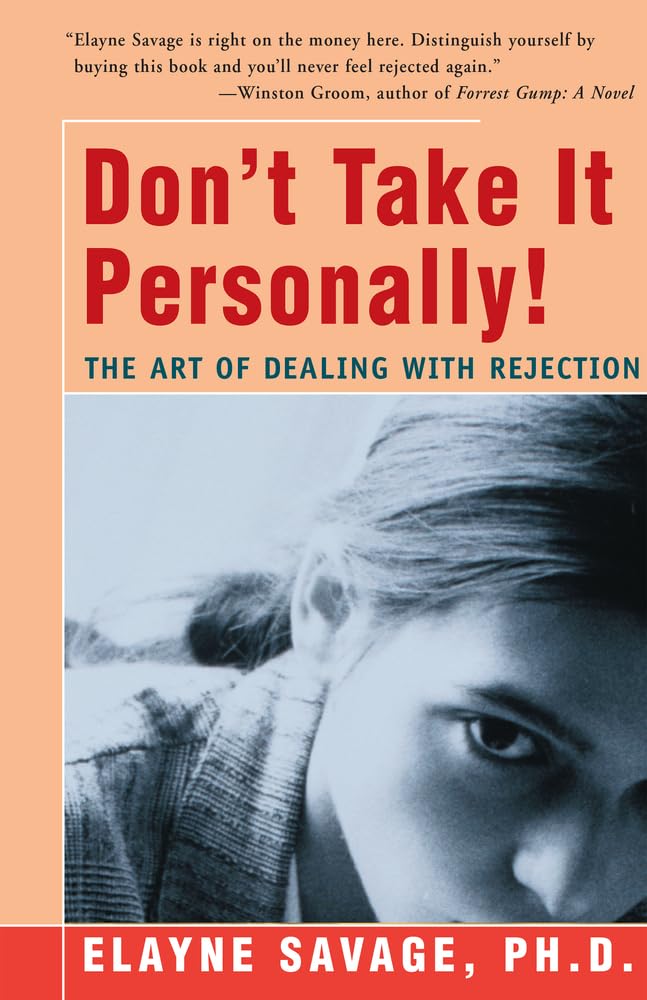TIPS FROM THE QUEEN OF REJECTION®
December, 2007
Welcome to the 13th issue of Tips from The Queen of Rejection(TM)
IN THIS ISSUE
1. Holiday Gift-Giving – Avoiding Disappointments And Hurt Feelings
2. Each Family Has 'Their Way'
3. About Hurt Feelings – A Cautionary Tale
4. Avoiding Misunderstandings
5. Caring Is Not Symmetrical
6. Disappointments Feel Like Rejection
7. Gift-Giving Tips
8. Contacting Elayne
9. Privacy Notice and Subscription Information
1. HOLIDAY GIFT-GIVING – AVOIDING DISAPPOINTMENTS AND HURT FEELINGS
By Elayne Savage, Ph.D.
Giving and receiving gifts can surely make the Holidays stressful. Who
hasn't felt some anxiety about shopping for just the 'right'
present.
And truth be told, most of us have felt some disappointment on the
receiving end. Especially when you feel the giver of the gift just
doesn't 'get' you at all because they are so off base.
You might tell yourself it really doesn't matter. And maybe
sometimes it doesn't. But what about when it DOES matter to you? What
about the times your feelings get hurt. Or the times you feel
slighted or offended. Or not cared about.
Whenever I present a program on expectations and disappointments,
the subject of gift-giving generates so much discussion, it could
easily be an entire presentation. There is really a charge to the
subject of gift-giving.
The Holidays are prime times for gift-giving dilemmas. All too
often someone gets their feelings hurt and takes something
personally.
Are they able to talk about their differences and work it out? Or
do all the hurts and resentments from the past year erupt? Do they
carry it around for months or even years?
2. EACH FAMILY HAS 'THEIR WAY'
It's not surprising there are so many hurt feelings and
misunderstandings about gift-giving. After all, each of us grew up
in different families with different ways of giving and receiving
presents.
Gift-giving has different protocol from family to family. For
example, in some families it may perfectly OK to give checks or
gift cards (Oh wow, I get to buy what I want!) In other families
this seems like a slight (Didn't she care enough to go shopping for
me?)
Some families feel fine about exchanging or re-gifting a present that's not quite
right. But in others, people wouldn't think of returning a gift —
they keep it even if they'll never use it, because taking it back
to the store feels disloyal or rude.
3. ABOUT HURT FEELINGS – A CAUTIONARY TALE
I write about how easy it is to get offended during the Holidays in
DON’T’ TAKE IT PERSONALLY! THE ART OF DEALING WITH REJECTION.
I describe how Elizabeth the mother, nursed hurt feelings for
six months after the exchange of Kwanzaa gifts before she talked to
her adult daughter about how hurt she was.
“I was surprised and felt misunderstood by my daughter's gifts to
me,” Elizabeth said. “Tracy has a good job now and when she kept
asking what I wanted, I told her to pick out something that she
thought I'd like. I was hoping she'd choose something that
represented my tastes, something that was me.
"My son guessed exactly what I'd like and bought me a satin robe. I
guess I expected something like that from my daughter as well.
"She gave me three separate presents, and not one of them reflected
who I am. Her gifts seemed so impersonal; it felt like she doesn't
understand me at all. Personalized gifts are so important to me
that I even get disappointed if a good friend gives me a book without
inscribing it."
What were the gifts? Two wine glasses, a video by one of my
favorite entertainers, and a pair of knitting needles. It was the
needles that confused me the most. Why would she give me knitting
needles, when I haven't knitted in over twenty years?
"I was hurt because I thought she was hinting she wanted me to be
more motherly or matronly or something when she said, 'Maybe you'll
take up knitting again.' Tracy can't possibly remember back to when
I used to knit sweaters for her. She was only four years old. I
didn't know what to do with the needles so I tucked them away in a
drawer.”
I was very touched by Elizabeth's story. She took the meaning of
Tracy's gift personally, thinking her daughter wanted her to be a
different kind of mother. It seems like this prevented her from seeing how much
caring went into all three gifts.
Was it possible that Tracy purchased three presents in hopes that
one of them would please her? Elizabeth at first had difficulty
looking at it this way, but as we continued talking she said,
“Well, yes, now I can see that Tracy put some thought into buying
the gifts. Actually the glasses were handblown and quite lovely and
Tracy and I have enjoyed them when we drink wine together. And it's
true that the video is one of my favorites — Tracy's, too.”
But what about those knitting needles? “Yes, in fact, they were
very nice knitting needles, probably expensive and, yes, most
likely from a specialty knitting store.”
I wondered if those needles may have been a gift of love that
symbolized fond memories from long ago? And again Elizabeth proclaimed
that Tracy was too young to remember the days when she knitted
those little sweaters.
But when mother and daughter talked about this in a joint therapy
session, Tracy did indeed remember those days.
“There's a knitting shop I sometimes pass, and each time I walk by,
I remember how you used to knit me those soft, warm sweaters when
I was a little girl. And Mom, I also remember hearing you say over
the years how you really should take up knitting again.' So I
decided to buy you some needles.”
Tracy's choice of gifts seemed to be a metaphor for how the past,
present, and future were energetically bound together.
4. AVOIDING MISUNDERSTANDINGS
For six months Elizabeth had felt misunderstood and hurt about the
presents, but hadn't expressed her feelings or checked out her
daughter's intent. Both Elizabeth and Tracy had leftover hurt
feelings from the giving and receiving of these presents. Tracy's
good intentions somehow got lost when she didn't explain the
intended special meanings. And Elizabeth's quick jump to
conclusions led her to misunderstand the nature of the gifts.
From the beginning, Elizabeth set herself up for disappointment
when she suggested Tracy buy her a gift that would please her.
Tracy couldn't read her mind. And Tracy presumed the
significance of her choice of gifts would be crystal clear to her
mother. But Elizabeth couldn't read Tracy's mind either.'
5. CARING IS NOT SYMMETRICAL
Caring is not symmetrical. There are probably as many ways of
showing it as there are people. There are probably just as many
ways of missing someone's intentions because their style of caring
is different from our own.
We learn styles of caring the same place we learn styles of
gift-giving. In our families.
6. DISAPPOINTMENTS FEEL LIKE REJECTION
Gift-giving is a surely a huge source of disappointments,
hurt feelings and misunderstandings during the holidays.
It's easy to take it personally if you don't get what you hoped
for.
But there’s even more rejection you can heap on if you are so
inclined.
You could tell yourself that the gift-giver doesn't care enough
about you. After all, if they did they'd have known what you wanted for
a present.
And if you are the gift-giver, you can find ways to get
disappointed and even take it personally. Do you shop
for the 'right' present for someone. Then do you find
yourself anxiously waiting to see the look on their face
when they open the present you so carefully chose.
Do you try to 'read' their reaction to your gift through their
expression or body language? What do you tell yourself?
Or do you shop for the perfect gift for someone, spending more
than you really wanted to, only to open their present to you and
find a sale item from the discount store? Do your feelings get hurt?
And what about gift cards? The media hype has been
"gift cards give someone the gift of shopping." Well, true
enough for someone who loves to shop. They appreciate gift cards
because they get the anticipation of looking for and picking out
the perfect gift for themselves.
Yet for someone else, receiving a gift card feels like a
personal affront. They might even tell themselves that the giver
doesn't care enough about them to do the shopping.
Again, here's a situation where disappointments feel like
rejection.
Some of us have never gotten over childhood
disappointments. Like the times when we thought we were promised a certain toy and
didn't get it. When a new disappointment comes our way,and it brings up some of those
old childhood memories and feelings. We may even go into our child 'default' position.
Sometimes we over react in the present to experiences from the past.
The disappointments that too often go along with the giving and receiving of
gifts contribute to the stress of the Holidays.
What can you do to make gift-giving go more smoothly?
7. GIFT-GIVING TIPS
You've most likely developed your own useful ways of handling
gift-giving. I'd like to hear from you what about what works in your situation.
Here are a few tips to consider:
-Know what YOU want. If you don't know, how can you expect anyone
else to try to figure it out.
-Don't 'hint around.' No one can read your mind. Be direct about
what you want. Surprises are great as long as you can keep from
getting disappointed.
– You could offer two or three gift suggestions. OR even pick out
two things you really love at your favorite store or online site.
asking the person who will buying you a gift choose which one to
buy for you. This way you can be sure it’s a gift you want.
It even has a bit of surprise element as well because you don’t
know which gift they'll choose for you. It’s worth having a little less
surprise in order to have lots less anxiety for both of you about
the gift-giving.
They’ll love you for making it easy and you get something you
really want.
Besides gift-giving, the other big-ticket Holiday
stressor is family gets-togethers.
And if you want some suggestions for surviving that family
holiday dinner, here are the tips from last month’s TIPS FROM THE
QUEEN OF REJECTION – Giving Gratitude or ‘Attitude.’
http://queenofrejection.typepad.com/tips/2007/11/index.html
© 2007 Elayne Savage, Ph.D.
Wishing you Happy Holidays,
Until next time,
Elayne
Elayne Savage is the author of books published in 9 languages.
To order DON'T TAKE IT PERSONALLY! THE ART OF DEALING WITH REJECTION from Amazon:
amzn.to/2bEGDqu
To order BREATHING ROOM — CREATING SPACE TO BE A COUPLE from Amazon:
amzn.to/2bAHmIL
REPRINTING THESE e-LETTERS
You can use the articles in 'Tips from The Queen of Rejection'(TM)
as long as you include a complete attribution and, whenever
possible, a live link to my website. Please notify me where and
when the material will appear.
The attribution should include this information:
Elayne Savage, Ph.D. is a communication coach, professional
speaker, practicing psychotherapist and author. To find out
more about her programs, and services visit
http://www.QueenofRejection.com
or call 510-540-6230.
6. Contacting Elayne
I welcome your feedback as well as suggestions for topics you'd
like to see addressed in this e-letter.
Here's how you can reach me:
Elayne Savage
elayne@QueenofRejection.com
510-540-6230, 2607 Alcatraz Avenue, Berkeley, CA 94708
7. Privacy Notice and Subscription Information
PRIVACY POLICY: Your name and email address are confidential.
I will not rent, trade or sell your contact information to anyone.


Leave a Reply